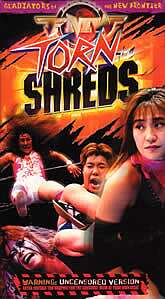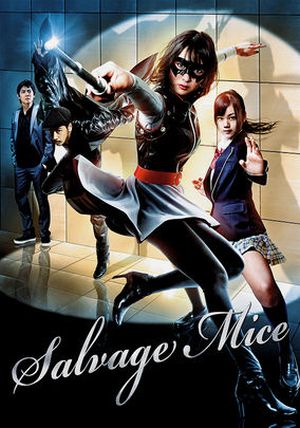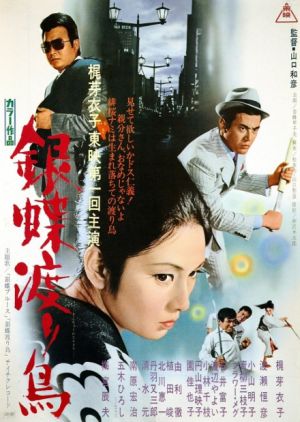★★½
“Bad girls go to…the seaside?”
 Serial escaper Ruriko (Sugimoto) is more persistent than good, and is dragged back to reform school after her seventh escape attempt ends the same way as her previous six. After whizzing through most of the standards of the women-in-prison genre in about 30 minutes or so e.g. corrupt staff, gratuitous nudity, solitary confinement, etc. she and a few of her colleagues (supposedly teenagers, but that clearly ain’t the case) break out as a group. Splitting up to avoid detection, they arrange a rendezvous at a deserted building by the sea, from where they plan to hijack a ship and escape Japan for good. Truth be told, a sense of urgency isn’t exactly top of the their skill-set, and as they meander their way there, various escapades happen, of which the only significant one is Ruriko meeting, by chance, a male criminal (Watase), who is also trying to out-run the law. But the police are also keen to ensure that they run their record in terms of Ruriko to a perfect 8-for-8…
Serial escaper Ruriko (Sugimoto) is more persistent than good, and is dragged back to reform school after her seventh escape attempt ends the same way as her previous six. After whizzing through most of the standards of the women-in-prison genre in about 30 minutes or so e.g. corrupt staff, gratuitous nudity, solitary confinement, etc. she and a few of her colleagues (supposedly teenagers, but that clearly ain’t the case) break out as a group. Splitting up to avoid detection, they arrange a rendezvous at a deserted building by the sea, from where they plan to hijack a ship and escape Japan for good. Truth be told, a sense of urgency isn’t exactly top of the their skill-set, and as they meander their way there, various escapades happen, of which the only significant one is Ruriko meeting, by chance, a male criminal (Watase), who is also trying to out-run the law. But the police are also keen to ensure that they run their record in terms of Ruriko to a perfect 8-for-8…
I watched this less than a week ago, but already, I can’t remember very much about it. Sugimoto is her usual charismatic self, and the film is certainly more interesting when she’s on-screen. However, the supporting characters are entirely forgettable, and in my mind, all merged into one amorophous, largely uninteresting blob. That’s particularly problematic after they split up, which is when the film seems to lose direction entirely, meandering around until the finale, where the police besiege the perps in their beach-house. I have to say, the major takeway from that is how incredibly inept the Japanese SWAT team are. Not only are they easily held at bay by criminals armed with precisely one gun, they mill around like disturbed sheep in the face of anything coming the other way, e.g. burning tyres, and are completely oblivious to even the most basic law-enforcement principle, such as “maintaining a perimeter.” If those are supposed to be the elite, it makes me wonder how the hell Ruriko managed to get herself caught the previous seven times she escaped.
It’s probably significant that the lack of compentence by the special forces of law and order is my lasting memory here. While competently made, and touching all the expected bases [that’s clear from the way solitary confinement in the prison involves Ruriko both bondaged up and topless!], it doesn’t have any real heart or passion, and if you skip this one, you won’t be missing much.
Dir: Sadao Nakajima
Star: Miki Sugimoto, Yuko Kano, Hiroko Isayama, Tsunehiko Watase





 I really wanted to use little barb-wire icons to mark this one, instead of the usual stars, but whenever I typed in “barb wire jpg” into search engines, I always seemed to find myself staring at Pamela Anderson. Yes, get those digressions out of the way early, that’s what I always say…
I really wanted to use little barb-wire icons to mark this one, instead of the usual stars, but whenever I typed in “barb wire jpg” into search engines, I always seemed to find myself staring at Pamela Anderson. Yes, get those digressions out of the way early, that’s what I always say… Thirdly, while they
Thirdly, while they  The only major change here is how
The only major change here is how  If its predecessor (reviewed here as
If its predecessor (reviewed here as  Having been largely unimpressed by Iguchi’s other work, which seemed to have little to offer except megabytes of digital blood, I likely wouldn’t have watched this except an accident involving beer and my Apple TV remote has stopped me from much of my usual viewing. I could still stream from Netflix, however, though when I saw this was dubbed in English, I almost didn’t bother. But surprisingly, this has easily the best plot of his movies, with a slyly-twisted sense of imagination that’s very effective.
Having been largely unimpressed by Iguchi’s other work, which seemed to have little to offer except megabytes of digital blood, I likely wouldn’t have watched this except an accident involving beer and my Apple TV remote has stopped me from much of my usual viewing. I could still stream from Netflix, however, though when I saw this was dubbed in English, I almost didn’t bother. But surprisingly, this has easily the best plot of his movies, with a slyly-twisted sense of imagination that’s very effective. I think I am officially over the whole Japanese uber-splatter thing. Either that, or I just don’t like Nishimura’s approach. He has been behind the last couple of examples I’ve seen (this and Tokyo Gore Police) and neither have reached the heights of te better genre entries. At 117 minutes, this is even more overlong than TGP and, to be blunt, I fell asleep before the end. Oh, there’s no lack of stuff going on, as we’ll shortly see, and certainly no shortage of arterial spray. However, neither of them make any significant impression, on either the emotional or visceral levels.
I think I am officially over the whole Japanese uber-splatter thing. Either that, or I just don’t like Nishimura’s approach. He has been behind the last couple of examples I’ve seen (this and Tokyo Gore Police) and neither have reached the heights of te better genre entries. At 117 minutes, this is even more overlong than TGP and, to be blunt, I fell asleep before the end. Oh, there’s no lack of stuff going on, as we’ll shortly see, and certainly no shortage of arterial spray. However, neither of them make any significant impression, on either the emotional or visceral levels. Out in the middle of the Japanese countryside is a square, unremarkable building that is the headquarters and training center for GAEA, one of the country’s leading women’s wrestling federations. Into this comes Takeuchi, making her second attempt to become a pro wrestler – the brutal training, under the glare of GAEA’s top wrestler Nagaua, caused her to give up last time. Will her second attempt prove any more successful? Can she get through to the final exam, and pass it to become a full member of GAEA?
Out in the middle of the Japanese countryside is a square, unremarkable building that is the headquarters and training center for GAEA, one of the country’s leading women’s wrestling federations. Into this comes Takeuchi, making her second attempt to become a pro wrestler – the brutal training, under the glare of GAEA’s top wrestler Nagaua, caused her to give up last time. Will her second attempt prove any more successful? Can she get through to the final exam, and pass it to become a full member of GAEA? Mai (Tanimura) and her partner (Sato) form a team – the titular rodents – who recover art and artifacts, and return them to their “rightful” owners – quotes used advisedly, it’s vague on the details. However, Mai is betrayed, and framed for the robberies actually being committed by the gang operating under the Evil Western Dude (Heselton, who was also the main villain in Karate Girl). Mai encounters Mio (Nagano), part of ‘Hiroshima Cleans’, a group of volunteers who help keep the city tidy. Initially, Mio thinks Mai is the villain, but is eventually convinced that the real bad guy is elsewhere, and the pair team up to take on the villains, including both Mai’s ex and Evil Western Dude.
Mai (Tanimura) and her partner (Sato) form a team – the titular rodents – who recover art and artifacts, and return them to their “rightful” owners – quotes used advisedly, it’s vague on the details. However, Mai is betrayed, and framed for the robberies actually being committed by the gang operating under the Evil Western Dude (Heselton, who was also the main villain in Karate Girl). Mai encounters Mio (Nagano), part of ‘Hiroshima Cleans’, a group of volunteers who help keep the city tidy. Initially, Mio thinks Mai is the villain, but is eventually convinced that the real bad guy is elsewhere, and the pair team up to take on the villains, including both Mai’s ex and Evil Western Dude. From the director of Alien vs. Ninja, the story here centres on a pair of ninjas, Shimotsuki and Hyotsuki, who are carrying on what appears to be a family tradition, kidnapping women from other clans’ villages, and taking them back to their own for nefarious purposes – let’s just say, the phrase “tools of pleasure” crops up on more than one occasion. They ar returning with their latest batch of four, including Kisaragi (Takeda), who is a ninja in her own right. With the help of a mysterious man (Sato), Kisuragi and her colleagues in imprisonment are released from their bondage – but that is only the first obstacle between them and their freedom. Of course, it turns out the heroine is not quite as innocent as she appears, and has an agenda of her own, because her mother was kidnapped by the same sleazy ninjas, when Kisuragi was just a baby.
From the director of Alien vs. Ninja, the story here centres on a pair of ninjas, Shimotsuki and Hyotsuki, who are carrying on what appears to be a family tradition, kidnapping women from other clans’ villages, and taking them back to their own for nefarious purposes – let’s just say, the phrase “tools of pleasure” crops up on more than one occasion. They ar returning with their latest batch of four, including Kisaragi (Takeda), who is a ninja in her own right. With the help of a mysterious man (Sato), Kisuragi and her colleagues in imprisonment are released from their bondage – but that is only the first obstacle between them and their freedom. Of course, it turns out the heroine is not quite as innocent as she appears, and has an agenda of her own, because her mother was kidnapped by the same sleazy ninjas, when Kisuragi was just a baby. There seem to have been a spate of these recently. Not just zombie flicks – though there’s been no shortage of those – but zombie flicks set in or around strip clubs. This is the Japanese take, and follows more or less the expected pattern of such things, combining nudity, violence and self-awareness in varying degrees. At least initially, this is definitely leaning towards a 70’s, grindhouse aesthetic, but after a few minutes, that aspect vanishes, and never really returns. Instead, it’s a fairly straight-forward tale of a motley crew of stereotypical strippers, e.g. the money-hungry one, the intellectual one (who quotes George Bataille), who work at a pretty crap club in a spa town, but who find a tunnel leading across the street, which brings them to a book of dark magic and a well containing an apparently infinite supply of zombies.
There seem to have been a spate of these recently. Not just zombie flicks – though there’s been no shortage of those – but zombie flicks set in or around strip clubs. This is the Japanese take, and follows more or less the expected pattern of such things, combining nudity, violence and self-awareness in varying degrees. At least initially, this is definitely leaning towards a 70’s, grindhouse aesthetic, but after a few minutes, that aspect vanishes, and never really returns. Instead, it’s a fairly straight-forward tale of a motley crew of stereotypical strippers, e.g. the money-hungry one, the intellectual one (who quotes George Bataille), who work at a pretty crap club in a spa town, but who find a tunnel leading across the street, which brings them to a book of dark magic and a well containing an apparently infinite supply of zombies. Nami is sent to jail for killing a Yakuza boss, and when she is released, returns to the Ginza district of Tokyo to live with her uncle, who runs a pool hall. She gets a job as a hostess in a bar, with the help of her new friend Ryuji (Watase), but the quiet life doesn’t last for long, even as she tries to help the widow of the man she killed – whose petition on behalf of Nami is what helped lead to her early release. For the local mob, in the shape of Okada (Nanbara) and his gang, are sniffing around the bar, seeking to take it over. To settle things, Nami offers to take on Okada’s champion at billiards, a challenge the gangster readily accepts, not realizing he has just been hustled, and that Nami is no mean player herself. Can she win – and even if she does, will Okada live up to his side of the bet?
Nami is sent to jail for killing a Yakuza boss, and when she is released, returns to the Ginza district of Tokyo to live with her uncle, who runs a pool hall. She gets a job as a hostess in a bar, with the help of her new friend Ryuji (Watase), but the quiet life doesn’t last for long, even as she tries to help the widow of the man she killed – whose petition on behalf of Nami is what helped lead to her early release. For the local mob, in the shape of Okada (Nanbara) and his gang, are sniffing around the bar, seeking to take it over. To settle things, Nami offers to take on Okada’s champion at billiards, a challenge the gangster readily accepts, not realizing he has just been hustled, and that Nami is no mean player herself. Can she win – and even if she does, will Okada live up to his side of the bet?